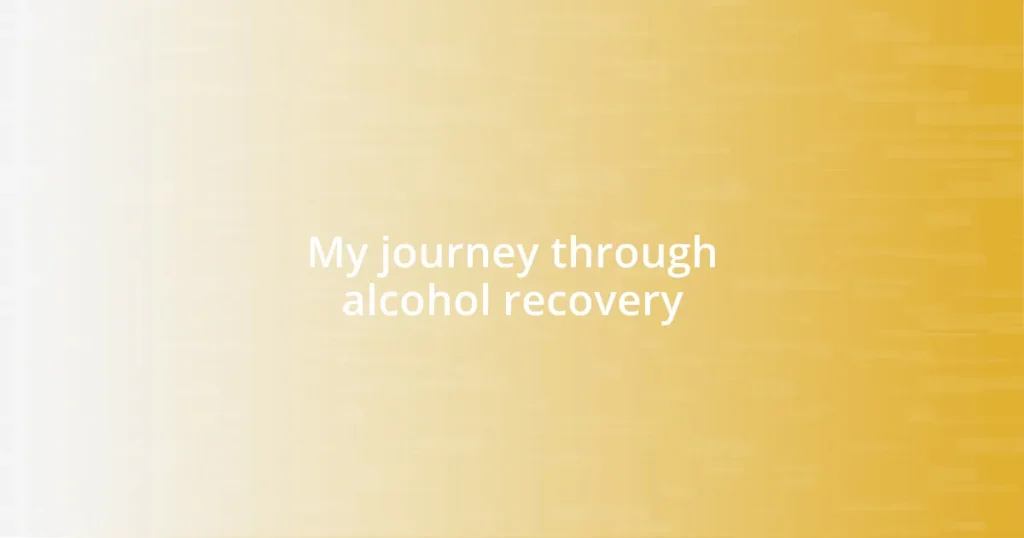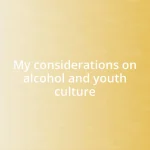Key takeaways:
- Understanding alcohol dependency involves recognizing its emotional and psychological roots beyond just consumption habits.
- Key indicators of needing change include frequent regrets, social dependency on alcohol, and physical symptoms affecting health.
- Setting personal recovery goals should be specific and flexible, focusing on both reducing alcohol intake and establishing positive activities.
- Community support and effective coping strategies, like mindfulness and journaling, play essential roles in maintaining sobriety and celebrating milestones.
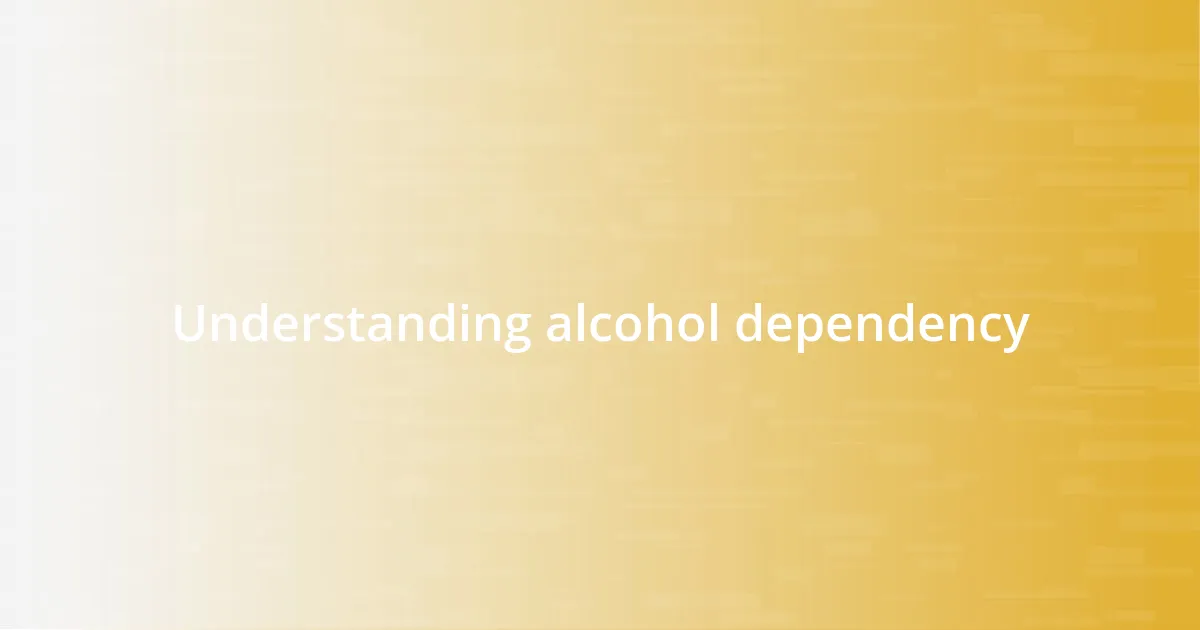
Understanding alcohol dependency
Understanding alcohol dependency is a complex process that often stems from a blend of genetic, psychological, and environmental factors. I remember when I first realized that my drinking was more than just a social activity; it was a way to cope with stress and anxiety. Have you ever found yourself reaching for a drink after a long day, convinced it was just relaxation, only to realize it became part of your routine?
As I dug deeper into my struggles, I learned that dependency can develop quietly, often disguised as normal behavior. There were moments when friends would point out my increasing alcohol intake, but I brushed them off, telling myself it wasn’t a problem. Isn’t it easy to ignore the signs when you’re caught in the whirlwind of daily life?
It’s important to recognize that alcohol dependency isn’t just about quantity; it’s about the relationship you develop with alcohol. At times, I felt a sense of loss when I considered life without my usual drink. It made me wonder—what would I turn to for comfort instead? Understanding this dependency goes beyond the bottle; it speaks to our emotional needs and the ways we seek to fill them.
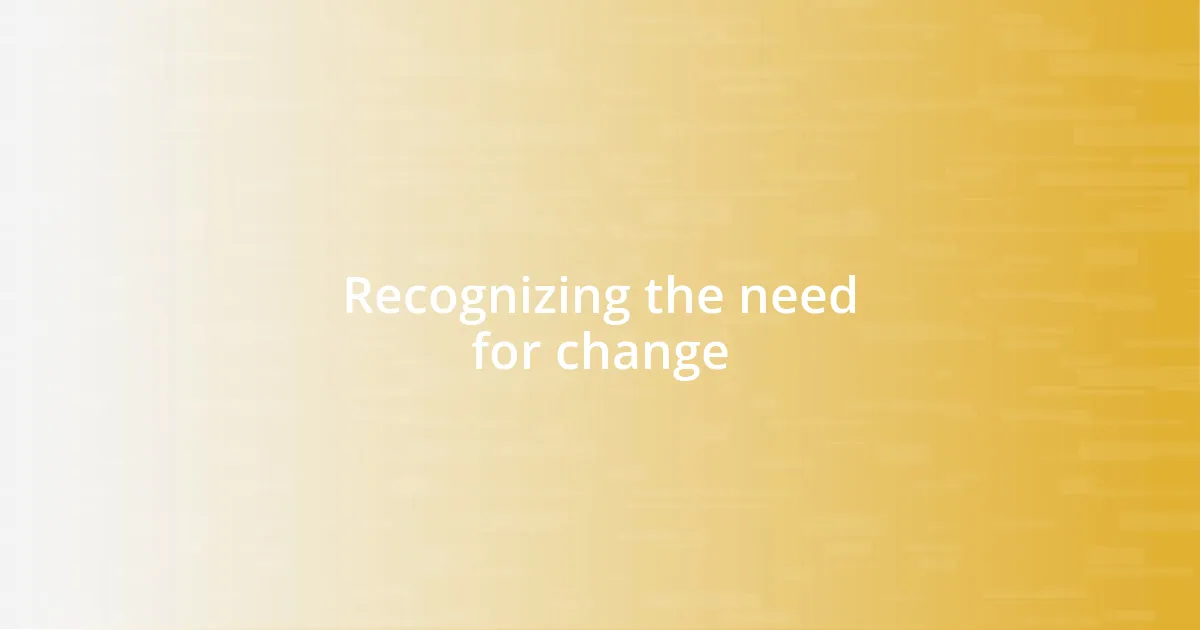
Recognizing the need for change
Recognizing the need for change can be an incredibly challenging moment. I vividly remember the day something shifted inside me; I was in a familiar setting, surrounded by laughter and clinking glasses, but all I felt was emptiness. That feeling was like a wake-up call, pushing me to confront the uncomfortable truth: my drinking was affecting my relationships, my health, and my overall happiness. Often, it takes a significant event or a gradual realization to finally see the impact of alcohol in our lives.
Here are some key indicators that signaled to me it was time for a transformation:
- Frequent Regrets: I often found myself regretting my decisions after nights out, wishing I had stayed sober.
- Social Dependency: I realized I sought out events specifically to drink, rather than for genuine connection with friends.
- Emotional Crutches: Many times, I drank not for enjoyment but to escape uncomfortable emotions, like loneliness or inadequacy.
- Physical Symptoms: I began noticing the toll alcohol was taking on my body; hangovers felt worse than before and recovery time extended.
- Self-Isolation: I started avoiding gatherings where I couldn’t drink, limiting my interactions with loved ones.
These realizations are crucial in identifying the need for change. For me, it was a gradual process, but every small acknowledgment of how deeply alcohol had woven itself into my life brought clarity and drove me toward a healthier path.
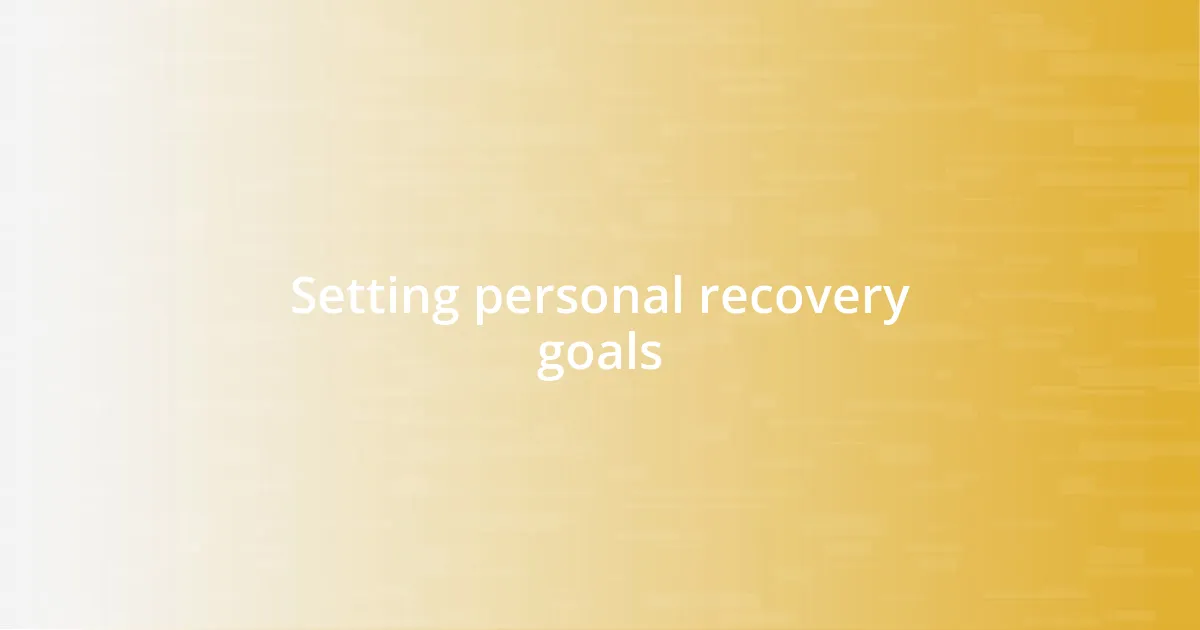
Setting personal recovery goals
Setting personal recovery goals is an essential step toward healing. When I started my journey, I realized it wasn’t enough just to want to quit drinking; I actually had to define what recovery looked like for me. I found it helpful to break down my goals into smaller, manageable targets. For instance, rather than telling myself to stop drinking entirely, I focused on reducing my intake to just weekends. This small win built my confidence and motivated me to keep pushing forward.
I remember sitting down to write my goals. I had a mix of emotions: excitement, fear, and a bit of doubt. At that moment, I decided to include not just drinking less, but also replacing that time with positive activities—like taking up hiking again, which I loved. I realized that each goal should not only focus on abstaining but also on what I could gain, rather than just what I was losing. This positive focus shifted my mindset and made the process feel more rewarding.
As I progressed, I learned the importance of revisiting and adjusting those goals regularly. Some days were harder than others, and the goals I set early on needed to evolve with me. I learned that flexibility is key—being kind to myself during setbacks helped maintain my momentum. Have you ever felt that pressure of rigid expectations? I found that giving myself room to recalibrate, instead of feeling guilty, truly supported my journey.
| Goal Type | Description |
|---|---|
| Short-Term Goals | Specific, achievable targets like reducing drinks to two per week. |
| Mid-Term Goals | Broader objectives, such as developing new hobbies to fill time previously spent drinking. |
| Long-Term Goals | Overall lifestyle changes, including healthier relationships and improved physical health. |
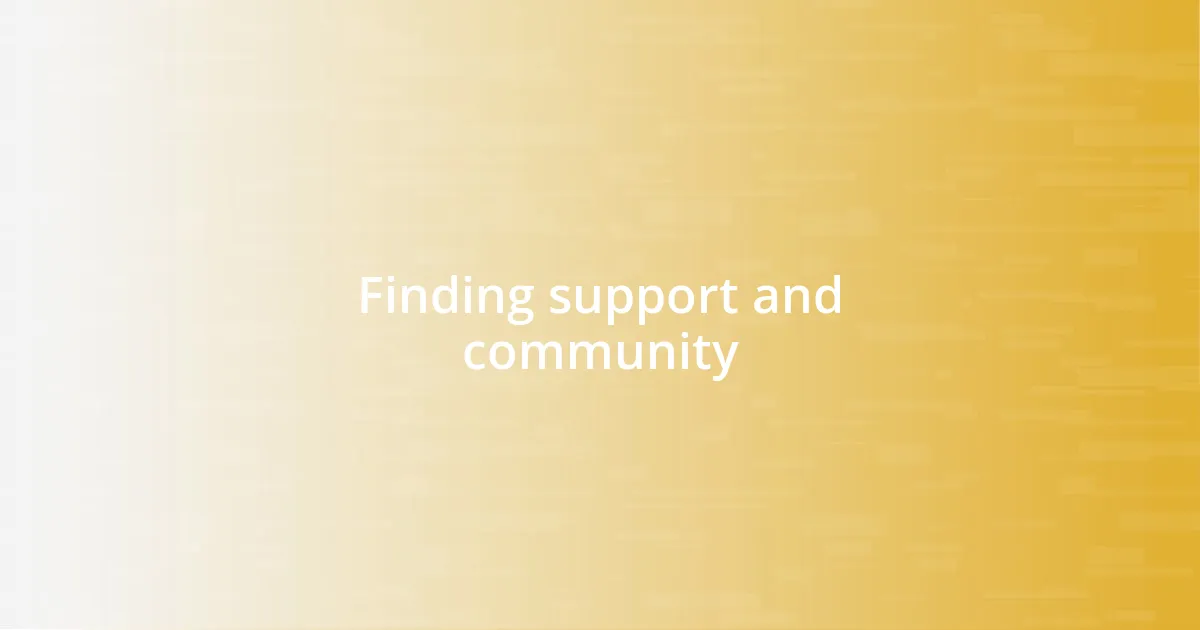
Finding support and community
Finding support and community can truly be a game changer in the recovery journey. I remember my first step into a support group—I was so nervous I could hardly breathe. But as I sat in a circle with others who understood my struggles, I felt an overwhelming sense of belonging. It’s incredible how sharing our stories can lighten the weight we carry, don’t you think? Each person there had their own story, but we were united in our desire for change, which helped me realize I wasn’t alone.
Connecting with others was not just about sharing hardships; it also opened doors to friendship and encouragement. I became close with a few members who later became my accountability partners outside of meetings. We cheered for each other’s milestones, and those small victories became powerful motivators. Have you ever found someone who just gets you? That’s what it felt like—like I finally had a safe space where I could be vulnerable without fear of judgment.
As I immersed myself in community, I discovered the value of both formal and informal support networks. I reached out to friends and family to share my commitment to sobriety, which built a deeper connection and understanding. Sometimes, it was about just grabbing coffee with a sober friend while discussing our weeks, offering mutual encouragement. In those moments, I realized that recovery isn’t just about quitting alcohol; it’s about nurturing relationships that lift us up. After all, isn’t recovery richer when shared with others on the same journey?
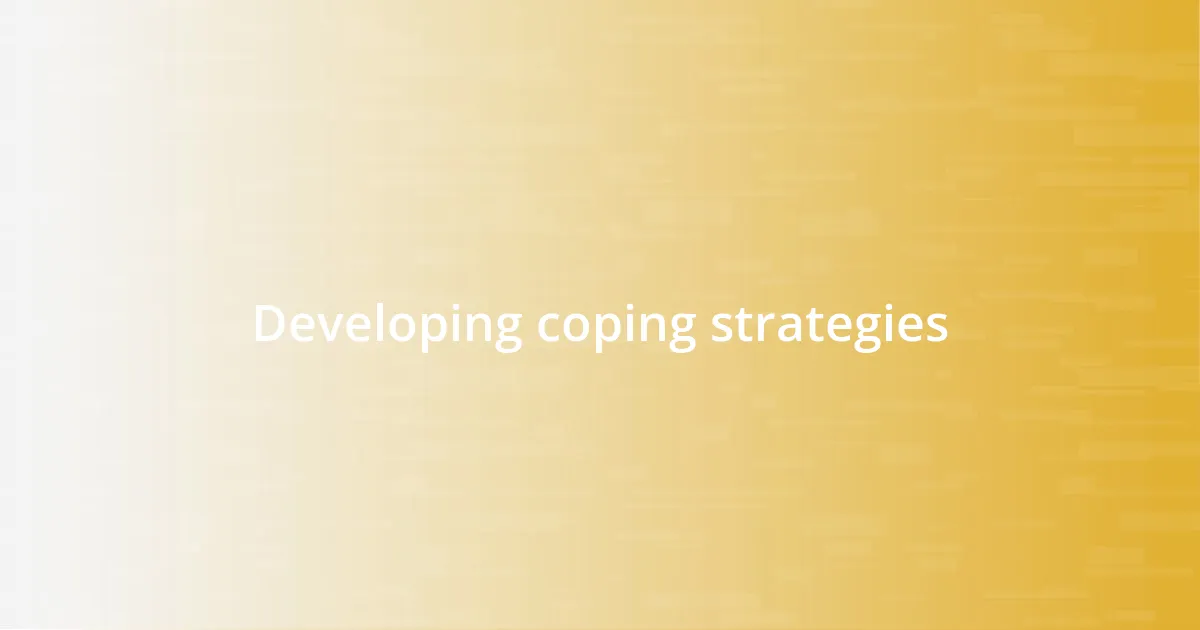
Developing coping strategies
Coping strategies became my lifeline during recovery. I vividly remember the first time I felt overwhelmed by cravings—I found myself reaching for my phone instead. I decided to create a list of distractions: reading a gripping novel, calling a friend, or even doodling in a sketchbook. That list became a tangible tool for redirecting my thoughts and emotions, offering me a sense of control during those challenging moments.
Every time I successfully sidestepped a craving, I felt a wave of pride wash over me. It was as if I had discovered a new superpower! One strategy that particularly resonated with me was mindfulness. I started practicing deep breathing, taking just a minute to focus on my breath when I felt anxiety creeping in. That small act transformed my day-to-day experiences and grounded me in the present. Have you ever tried something so simple yet felt its enormous impact on your life? That realization—how a moment of awareness could shift my mood—was enlightening.
As I navigated the ups and downs of recovery, journaling became a vital part of my routine. Each evening, I would reflect on my day, jotting down my successes and struggles. This practice not only provided clarity but also a safe space to process my emotions. I often discovered patterns in my feelings and behaviors that I hadn’t noticed before. It’s amazing how writing can help illuminate the shadows of our thoughts, isn’t it? By developing these coping strategies, I truly learned to embrace my emotions rather than fear them, which was essential for my growth.
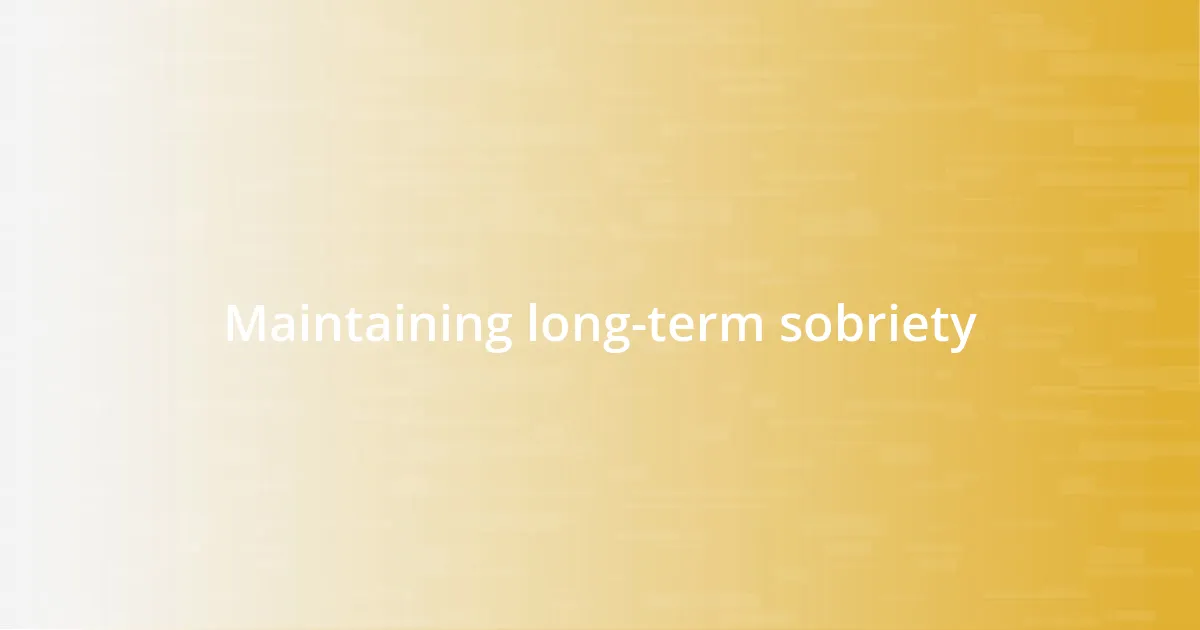
Maintaining long-term sobriety
Maintaining long-term sobriety isn’t just about avoiding alcohol; it’s a continuous journey of self-discovery and resilience. I recall a moment early in my recovery when I faced a significant trigger at a family gathering. Instead of succumbing to temptation, I took a deep breath and stepped outside for a quick walk. In that instant, I learned the value of having a plan to navigate high-risk situations. Isn’t it empowering to realize that you can choose your response?
In addition, I’ve found that creating a daily routine centered around self-care plays a crucial role in my sobriety. Every morning, I dedicate time to exercise, meditate, and have a healthy breakfast. Those simple actions set a positive tone for my day. It’s fascinating how structured days can keep distractions at bay and help me stay focused on my goals. Have you noticed how surrounding yourself with positivity can influence your outlook on life?
Moreover, I’ve learned that reflection is vital in sustaining my sobriety. I set aside time each week to assess my emotional and mental health. This practice helps me identify stressors and patterns before they become overwhelming. I remember one particular week when I had neglected this check-in and found myself feeling irritable and restless—signs that I was pushing myself too hard. A few moments of honest reflection brought clarity and allowed me to adjust my approach. Isn’t it intriguing how self-awareness can be a powerful tool in managing our days?
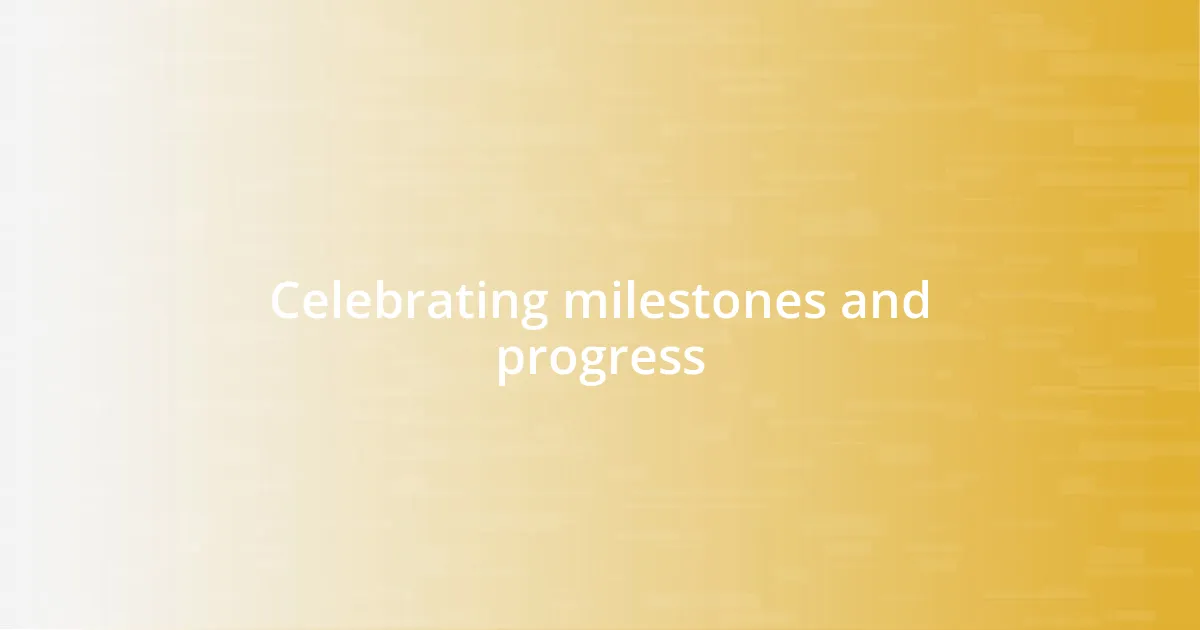
Celebrating milestones and progress
Celebrating milestones in recovery is crucial. I still remember the day I hit my first month of sobriety—it felt surreal. I decided to treat myself to my favorite lunch spot and revel in the accomplishment. Have you ever paused to appreciate how far you’ve come? Those moments of recognition were like little checkpoints on my journey, reminding me to cherish the progress.
As I moved forward, celebrating each milestone became a ritual of sorts. I began marking my 30, 60, and 90 days sober with small but meaningful celebrations. Whether it was a simple dinner with friends or a day spent exploring nature, these celebrations reinforced my commitment. Reflecting on these achievements helped me see them not just as days passed, but as significant steps toward a healthier me. The joy I felt was contagious—sharing my victories brought my loved ones even closer.
It’s fascinating how personal reflection ties in with celebrating milestones. Last year, I took time to create a visual timeline filled with my accomplishments: a collage of photos from gatherings I attended sober, certificates from workshops, and even some heartfelt notes from friends. Looking at this tangible representation of my journey filled me with gratitude. Do you keep a record of your milestones? I find that the act of documenting progress can instill confidence and serve as a powerful reminder of resilience during tough times.










